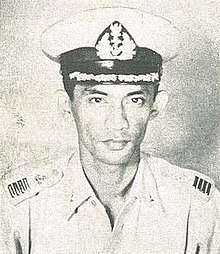Ali Sadikin
Born to parents of ethnic-Sundanese descent, Ali attended the Semarang Shipping Science Polytechnic during the Japanese occupation period.
[1] During the war of independence, Ali joined the Naval Section of the People's Security Agency, the forerunner of the modern Indonesian Navy.
"[1] Ali Sadikin was directly inaugurated by President Sukarno as Governor of Jakarta on Thursday, 28 April 1966 at 10:00 at the Merdeka Palace.
In that decision, Ali, who is also a member of the staff of the Deputy Minister for Economics, Finance, and Development, was deemed capable and fulfilled the requirements to become the Governor of Jakarta.
[2] He sought to improve public services, clear out slum dwellers, ban becaks (cycle rickshaws), and outlaw street peddlers.
[3] Sadikin's role in bulldozing poor areas of Jakarta was part of a long history of struggle over land use in the region.
[5] For Abidin Kusno,[6] Sadikin was part of a modernist program to attack irrationality, criminalize poverty, and create obedient national citizens.
[10] Hungry for revenue for his projects, Sadikin legalized gambling and steambaths (de facto brothels), much to the outrage of many Muslim groups.
Notably, he oversaw the construction and inauguration of Ismail Marzuki Park, an arts, cultural, and science center located at Cikini in Jakarta, Indonesia, on the site of what was then the Ragunan zoo.
Taman Ismail Marzuki complex comprises a number of facilities including six performing arts theaters, cinemas, exhibition hall, gallery, libraries and an archive building.
The first facility was the Bina Ria Ancol beach, best known for its drive-in theater especially during the 1970s, then followed with a golf course, swimming pool, oceanarium, Putri Duyung cottage, Hotel Horison and its casino.
[13] In 1975, Sadikin famously attended the wedding of Indonesia's first trans woman legally recognised as her true gender, Vivian Rubiyanti Iskandar.
Participants of the Petition of Fifty included a group of powerful and highly influential critics of the New Order, including former Chief of Staff of the Armed Forces General Abdul Haris Nasution, former National Police Chief Hoegeng Imam Santoso, and former Prime Ministers Burhanuddin Harahap and Mohammad Natsir.
Though he remained a resolute statist in favor of militarism, he opposed President Suharto's consolidation of power in the government and military (ABRI).

